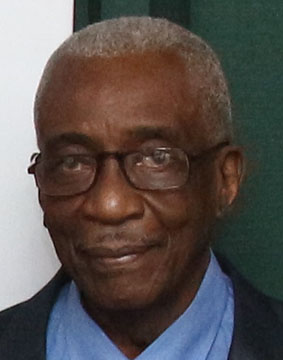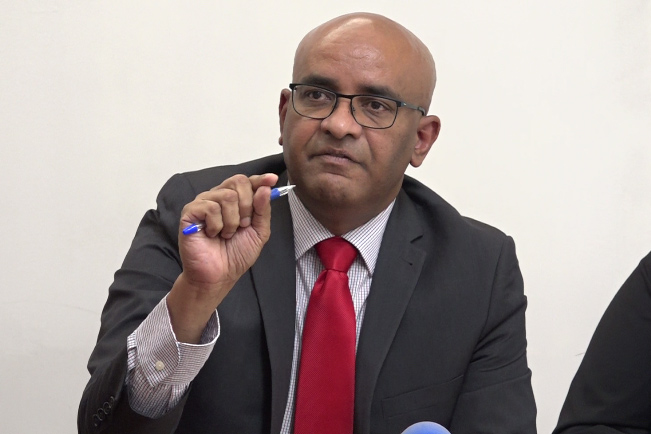Opposition Leader Bharrat Jagdeo has expressed surprise that Guyana Elections Commission (GECOM) Chairman Justice (Ret’d) James Patterson is reluctant to meet with the United Nations Development Programme (UNDP) after the elections management body had requested its help.
“I suspect that he (Patterson) is taking directions from elsewhere,” Jagdeo told a news conference that was held yesterday at his Church Street, Queenstown office.
Based on GECOM’s request for help, Jagdeo said, the United Nations sent a team that did an assessment of GECOM’s needs and subsequently proposed that a UNDP official meet with the Chairman. However, he charged that Patterson is reluctant to meet with the UNDP official to discuss the recommendations, which include offers of assistance. “In spite of his (Patterson’s) lofty talk about impartiality and good conduct of elections,” Jagdeo said, “we can trace partisan actions on his part to every moment when there is a critical decision that has to be made at the level of the commission.”
“There is no movement. When there is, you will be informed,” Patterson told Stabroek News on Wednesday, when he was asked for an update on the status of the report and the UNDP’s offer to advance the recommendations.

GECOM will discuss the issue with the commission, after which the outcome, Patterson said, would be aired. “Other than that, I have nothing to say to the press,” he added.
The United Nations report had recommended that for the November, 2018 local government polls and the 2020 general elections, the UN must provide technical assistance to GECOM in a clear framework and the parameters, responsibilities and limitations need to be properly communicated to stakeholders and the public in general because of widespread mistrust among political actors across public institutions, “including GECOM.”
The assessment was conducted between May 7th and May 11th, 2018, at GECOM’s request for technical assistance in information and technology to provide expertise in database and information management systems, including the transmission of elections results.
On the local government elections (LGE), Jagdeo assured that the PPP has no interest in postponing them as it is ready. “We will submit our lists for all 80 local government bodies on the 21st [of September],” he noted.
He, however, pointed out that the PPP has an obligation to ensure that the law is upheld, which is why it supports the court challenge of GECOM commissioner Bibi Shadick, who has claimed that Minister of Communities Ronald Bulkan did not follow the law in setting up and altering a number of local government bodies and that GECOM in agreeing to demarcate the boundaries on the ground did so in an illegal manner.
One week could be spent in consultations and the minister could easily reissue the orders under the appropriate act in a day, he said.
GECOM, as a technical body, he added, has an obligation to consult with all the parties in demarcating the boundaries.
Even before the LGE are held, Jagdeo charged, GECOM would have reduced the PPP votes and seats that they won in the 2016 LGE by about 60 seats.
“By simply gerrymandering the boundaries, they would have reduced the votes. They will win more areas without getting a single additional vote. In fact, they will be beaten even more badly than the last LGEs in which we won 47 NDCs and tied another eight of the NDCs and municipalities. They will lose more popular votes. We will get a bigger margin, the popular votes, but they will win more seats because of the gerrymandering of the boundaries. That is what we are arguing against,” he said.
Fears about the rigging of elections, he added, are not unreasonable because of the history of the PNC—the main constituent of APNU—which, he said is well documented in
international reports, including those of the CIA, the US State Department, and the Carter Center, and “because some of the players of that past are still prominent in government.”
He added, “The fear is not unreasonable and that fear has been compounded by the unilateral action of the president in repudiating that 25 years formula,” while alluding to President David Granger’s unilateral appointment of Patterson as GECOM Chairman.
Jagdeo maintained that Granger violated the Constitution in appointing Patterson unilaterally and said while the president has said he wants reforms in Guyana’s interest, “he ignores all of his actions that have been undermining consensus, cohesion and moving forward and the actions are many in terms of GECOM.”
Making it clear that the PPP is not reticent to discuss anything, he said the party is “very cautious to ensure” that a formula enshrined in the Constitution, which emphasises impartiality and joint participation in selecting the Chairman, is not undermined in favour of one that will remove consensus and impartiality.
Saying that the Carter-Price Formula has outlived his usefulness, Granger recently said he favours the involvement of the National Assembly in determining the composition of GECOM.
While making it clear that no proposals have yet been made for the reform of GECOM, Granger said that while he favours this move, “we must adopt the architecture… the procedures which are in place for other constitutional commissions… so the reform of GECOM, just [like] you have at the Police Service Commission or the Public Service Commission, would depend on the nomination of human beings coming through the National Assembly and coming from political parties.”
Granger noted that the formula along with campaign financing and power sharing could be added to the agenda for several meetings he will be having with Jagdeo during this month.
Jagdeo said a model based on having a two-thirds majority in the Parliament to appoint the Chairman of GECOM does not necessarily mean that there would be no gridlock as was seen in getting Public Procurement Commission in place. That process took 14 to 15 years, he said.
Jagdeo added that his own suggestion that they consider outsourcing the conduct of the polls to a consensually chosen international body, such as the United Nations, did not mean that he was advocating for it but that it should be discussed.






